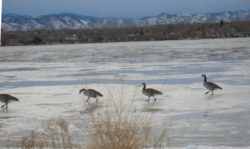Sloan's Lake
| Sloan Lake | |
|---|---|
.jpg) View facing east towards downtown Denver | |
| Location | Denver, Colorado, US |
| Coordinates | 39°44′56″N 105°02′51″W / 39.748876°N 105.047483°WCoordinates: 39°44′56″N 105°02′51″W / 39.748876°N 105.047483°W |
| Basin countries | United States |
| Surface area | 177 acres (72 ha) |
| Surface elevation | 5,308 ft (1,618 m) |
| Settlements | Denver |
Sloan's Lake[1] is a body of water, park, and neighborhood in Denver, Colorado, US. The neighborhood is located on the northwest side of Denver. The lake is the central feature of Sloan's Lake Park, which is managed by the Parks and Recreation division of the City and County of Denver.
Location
Sloan's Lake is located on the western edge of Denver's city limits, adjacent to the suburbs of Lakewood, Edgewater and Wheat Ridge. The approximate boundaries are Sheridan Boulevard to the west, 17th Avenue to the south, Raleigh St. to the east, and 26th Avenue to the north.[2] There are no tributary rivers to the lake.
History

The true history of the creation of Sloan's Lake may never be officially known, but during the settlement of the Denver area in the mid to late 19th century, the lake did not exist. A road connecting Denver and the western suburb of Golden crossed through where Sloan's Lake is now. A homesteader named Thomas F. Sloan received a patent for the land from US President Andrew Johnson in December 1866. He used the land for agricultural purposes, farming and raising cattle. A commonly accepted legend states that Sloan dug a well on the land, inadvertently tapping into an underground aquifer, and that when he awoke the next morning, part of his farm land was covered in water.[3] That flooded this part of what was known as South Golden Road, and the realigned thoroughfare now known as Colfax Avenue would become the major east-west thoroughfare in this part of the city. However, according to gold rush era stagecoach driver Bill Turner, the lake appeared sometime between when he left for Kansas in June 1861 and when he returned in early 1863.[4] It is possible that Sloan occupied the land prior to patenting it. The lake once exceeded 200 acres (0.81 km2) and extended north and west beyond its current size, but portions were filled north of 25th Avenue and west of Sheridan Boulevard.[5] The area surrounding the lake was once home to an amusement park and swimming facility known as Manhattan Beach. Opened to the public 27 June 1881, it was the first amusement park to be built west of the Mississippi River (it burnt down in 1908 and was rebuilt as Luna Park later that year); mishaps and competition from other such attractions in the vicinity (Elitch Gardens and Lakeside Amusement Park) led to its closure in 1914. Cooper Lake, a separate body of water just southeast of Sloan's Lake, fell under the jurisdiction of the federal Works Projects Administration in the 1930s, and a plan was developed which involved building channels beneath the surface of the water on both lakes. This essentially created one body of water that has commonly become known as Sloan's Lake. The size of the present-day combined Sloan's Lake and Cooper Lake is 177 acres (0.72 km2).
Character
At 177 acres (0.72 km2), Sloan's Lake Park is the second largest park in Denver (after City Park). Typical activities at Sloan's Lake include hiking, jogging and bicycling on the trails and sidewalks that surround the lake, and fishing and boating on the lake itself. There are basketball and tennis courts located in the park. An annual event known as the Dragon Boat Festival attracts thousands of visitors each summer, celebrating Asian American culture and civilization.
The population of the neighborhood is approximately 8,500 residents. According to the 2000 census, the average household income is $48,300, somewhat less than the Denver city average. The neighborhood has a wide range of incomes, with about twelve percent of the population under the poverty line and 16.5 percent of the population making more than 200 percent above the Denver average. The housing stock in Sloan's Lake is likewise diverse with a wide range of housing and styles including 1920s bungalows to new, post-modern architecture. More than 55 percent of Sloan's Lake residents own their home, an above average figure for Denver. The average home sale price in Sloan's Lake is $259,000, nearly $20,000 less than Denver's average.[2]
The neighborhood's total crime rate of 53 per 1,000 people is below that for the city as a whole.[2]
References
- ↑ See official map at https://www.denvergov.org/portals/747/documents/parkart/ParkArt_Sloan%27s%20Lake%20Park.pdf. Also known as Sloan Lake or Sloans Lake; see "U.S. Geological Survey Geographic Names Information System: Sloan Lake".
- ↑ 2.0 2.1 2.2 Neighborhood summary: Sloan Lake The Piton Foundation. Retrieved 24 May 2009.
- ↑ Sloan Lake Park Trails.com Retrieved 24 May 2009
- ↑ Colorado Transcript, 29 April 1909.
- ↑ "Here there be dragon boats..." ScienceBlogs.com, 31 July 2006. Quote from Sloan's Lake Park: From Indian Playground to Urban Oasis by William W. Johnston. Retrieved 24 July 2009.
External links
- Denver Parks information at denvergov.org
- U.S. Geological Survey Geographic Names Information System: Sloan's Lake
| |||||||||||||||||||||||||||||||||||||||||||||
